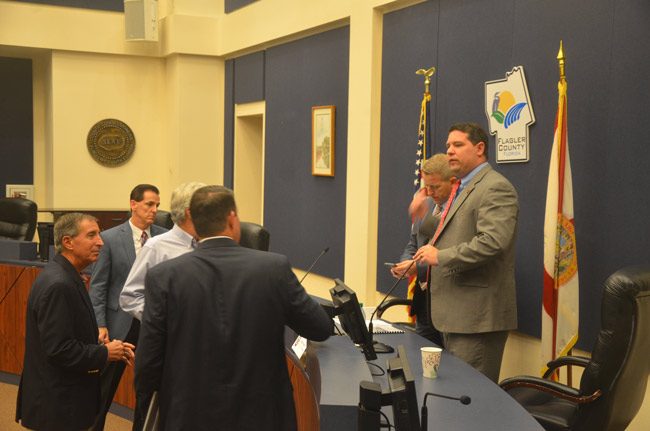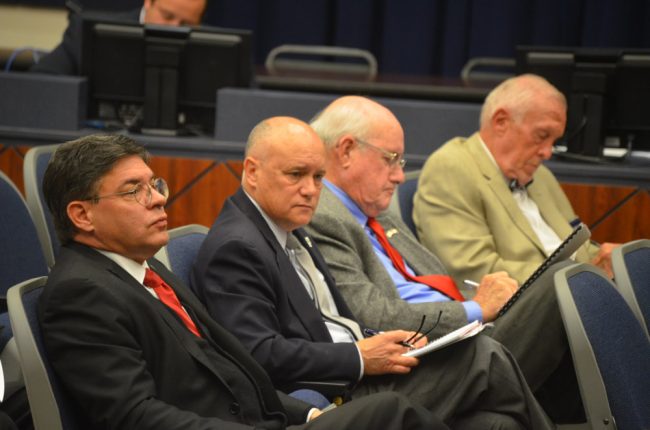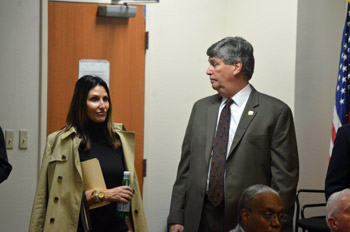
Ninety minutes into the annual meeting of Flagler County’s annual legislative delegation this afternoon in Bunnell, Jim Ulsamer, never a stranger to candor, sharply summed up the year’s overriding political challenge as he spoke to Sen. Travis Hutson and Rep. Paul Renner: “Your terms are going to be to some degree defined by how well we’re able to bounce back and rebound and recover from all this damage.”
Ulsamer, who was speaking for the Hammock Dunes Owners’ Association, was referring to recovery efforts after Hurricane Matthew. Almost half the two dozen people who addressed Renner and Hutson today touched on recovery efforts in part or in full, reflecting the urgency of the issue for Flagler, and the absence, gaping for the most part, of clear answers on what agencies can be counted on to rebuild, with what money, based on what designs and when. For now, it’s all local improvisation paid for by local emergency and reserve funds. But local governments—Flagler County, Flagler Beach—and local homeowners’ associations in the Hammock, several of whose representatives addressed the lawmakers, want help.
Hutson and Renner gave them assurances that they’d be on it, but not the sort of assurances that did more than give hope: no timetables, no promises of dollars. For all the severity of the storm’s effects on Volusia, Flagler and St. Johns counties, Hurricane Matthew remains a relatively regional disaster with limited rather than statewide consequences, and Renner cautioned the audience about the Legislature’s precarious financial outlook: “We have a difficult budget we’re entering into, we had a great year last year. It’s going to be tougher this year. However, that doesn’t mean priorities go away, so take none of my remarks to mean that priorities are any less priorities this year. It means it’ll be a lot harder to get funding, and we’ll have to choose between some very important priorities and make very difficult choices as to where the money should be appropriated.”
The local priorities they’d heard as local government after government brought its wish lists to the lawmakers consisted in the end of two big pots. One contained the usual variety of requests: help with paying for wastewater treatment plants in Palm Coast and Flagler Beach, paying for the school district’s Adults with Disabilities program (already paid for, the lawmakers were pleased to say), for the county’s drainage problems, for Bunnell’s economic development, money the Free Clinic, for mental health programs, and so on.
The needs are clear. The sources and manner of help are not.
The other pot overflowed with the two most recurring requests of the afternoon: hurricane recovery dollars, but also a second county judge for Flagler, to relieve the load on Judge Melissa Moore-Stens, whose docket is considered to be the most burdensome in the state. There was even a moving moment toward the end of the meeting when Moore-Stens, who was not there, found her most ardent advocate in the one man with whom she’d had a public and unsettling confrontation a few weeks ago: Ralph Lightfoot, who chairs Flagler’s Democratic Executive Committee, and who, during a canvassing board meeting the judge chaired, directly and repeatedly challenged Moore-Stens’s devotion to the task, questioning whether she was putting in the time required. When the judge defended herself, saying she still had a docket to attend to—and that she was overworked—Lightfoot said she should get an additional judge. Moore-Stens didn’t disagree. Lightfoot subsequently walked back some of his comments and said he’d do what he could to push for an additional judge.
Today, he made good on his pledge.
“We are larger than Putnam. Almost 37,000,” Lightfoot told the lawmakers, citing the difference in population between Putnam and Flagler counties. “They have two judges. Is there any way to switch that funding over to Flagler? The other question is: is there anything we can do as citizens of Flagler to help persuade the Legislature to come up with the funding.”
The recommendation from the Florida Supreme Court, in addition to adding circuit and county judges across the state, is also to decertify some of their locations “due to a lower case load,” Renner said, “ and I believe Putnam is one of those counties. This will not mean that a judge goes away tomorrow, but when they attrit out then they would not be replaced.” Áttrit is the abbreviation of “attrition.”
Still, Hutson said, “the second you get rid of a judge somewhere else and put another judge here, she now has one of the lowest dockets.” Then Flagler would be in a position to have to protect the additional judge, risking losing her or him.
An additional judge was also among Flagler County’s priorities.
But by far the most recurring topic of discussion were the beaches. It matters. Some years have dominant themes. Internet cafés dominated one session a years ago, short-term vacation rentals dominated another, and the Legislature, notably, acted substantially on both, essentially banning Internet cafés and restoring a measure of local control Flagler sought over its short-term vacation rentals. So the legislative delegation session is not all talk.

“Our role is funding and as the storm came in obviously the executive branch, I think the governor and his agencies did a nice job, the county did a nice job,” Renner said. “Storms overwhelm systems and it takes some time to get back to normal. Now we’re at a funding point and we’re certainly willing to have you blow up—I’m willing to have you blow up my cell phone and I’m sure Sen. Hutson is too, and will be happy to give you that number here after we adjourn, to push people to move faster and certainly that’s the case here. I do think we’re getting to a point where we now have folks from the federal government who are going to be talking to our county officials to bring home some funding and talk about what the design looks like so that the funding can be there to get a permanent solution.” (Ulsamer had not only framed beach recovery as a defining issue for the lawmakers. He’d wished them “much success in your efforts and offer our full support and anything that we can do to help you.”)
But local officials did get clarity from their lawmakers on at least one count: neither of them wants the Department of Transportation to build sea walls anywhere on Flagler’s 18-mile coastline.

“A robust dune system” was McLaughlin’s answer, to the approval of the Flagler Beach City Commission, four of whose six members were in the audience.
Hutson then said that sea walls would be considerably more expensive and more damaging to the long-term health of the beach, making the choice a “no-brainer.”
“I don’t think we need a seawall, I don’t think we need to lose our beaches,” he said. “Those two options are unacceptable.” It was the only line of the evening that got applause.
“I agree with Sen. Hutson’s remarks,” Renner said.
Other requests to lawmakers included a plea from Janet and Dennis McDonald (Janet being a member of the school board, but speaking, along with her husband and two other people, as a member of a group called “Florida Citizen’s Alliance”) for more local control in education issues and the scrapping of the state’s Common Core-like curriculum, and a request from Bob Hamby for the passage of a law to beef up Second Amendment protection, an amendment not often considered threatened in Florida, where year after year the National Rifle Association ensures that guns and the Second Amendment have an especially privileged position in state law.
At this afternoon’s legislative delegation meeting, McLaughlin, the county commissioner, ensured that the First Amendment’s prohibition against state sponsorship of religion had a distinctly less privileged position as he started the meeting with an overtly Christian prayer, complete with invocation to Jesus Christ and “our heavenly father.”






























Walk like you talk... says
Beverly Beach & other places need to be replanted with Sea Oats & purple flower vines. As Ive posted before, contact U of F, for information, about Sae Oats that have been FROZEN & KEPT, for the future, after the Last, bad storm Putting grass, thats NOT indigenous, to THAT area, is wrong. Sea Walls only continue to make sand wash back out to SEA—. PERIOD.
Bev Beach is Baren, its ALL gone, out toseal, sheared off litle a 6 ft cliff now—-^ above, I made a typo, meant to say- Seeds were SAVED, and should, & probably ARE available.
Sw says
Try a Judge who likes up repeat offenders